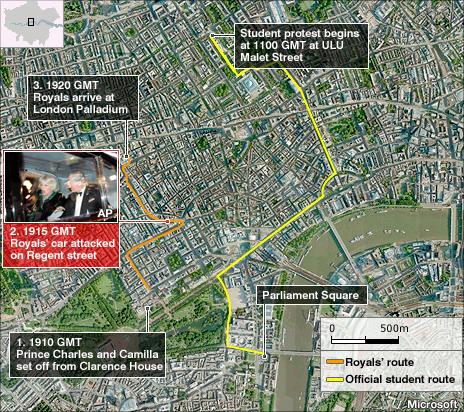Student protests: Met launches criminal investigation
- Published
Amateur footage of the attack on the Rolls-Royce carrying the royal couple
The Metropolitan Police has launched a "major criminal investigation" into the disorder during student protests in London in recent weeks.
The force said a "significant number" of protesters had been "intent on violence", and people suspected of criminal behaviour would be prosecuted.
A car carrying the Prince of Wales and Duchess of Cornwall was attacked during violent scenes in London on Thursday.
MPs had voted to allow university tuition fees to rise to up to £9,000.
In a statement, Scotland Yard said it had launched an investigation into "the student disorder seen across London between 10 November and 10 December".
The force said: "Whilst a large majority of protesters came to demonstrate peacefully, a significant number came intent on violence.
"This will not be tolerated and anyone identified as being actively involved in criminality at the student protests will be prosecuted."
Further developments on Friday included:
The Independent Police Complaints Commission is investigating a claim that 20-year-old Middlesex University student Alfie Meadows suffered serious head injuries after being hit on the head with a police truncheon
A Mayor of London spokesman said the cost of repairing damage in Parliament and Trafalgar Square could exceed £50,000
A small but vocal demonstration of about 100 people chanted about tuition fees as the prime minister arrived in the Harehills area of Leeds for a speech
Don Foster, one Lib Dem MP to vote for the rise, has had a rock thrown through his office window
Cambridge University student Charlie Gilmour, son of Pink Floyd guitarist David Gilmour, apologised for climbing the Cenotaph, a memorial to Britain's war dead, calling it a "moment of idiocy"
Business Secretary Vince Cable said the Lib Dems were still "united" despite the rebellion
During three previous days of national action by student protesters, there were scuffles with police and numerous arrests.
The latest demonstration by thousands of students in London, on the day MPs voted on the reforms, involved the worst violence.
Protesters largely took over Parliament Square and pressed against police lines in front of the Houses of Parliament.
Mounted police were used to control crowds, at one point charging a group of protesters. Hundreds were contained on Westminster Bridge for a time by officers.
Protesters threw flares, sticks, snooker balls and paint balls, according to police. After nightfall, riot police forced back protesters who were smashing windows at the Treasury and the Supreme Court.
Then at 1915 GMT, protesters launched an attack on the royal couple's car as it passed along a busy Regent Street. The Rolls Royce was kicked, splashed with paint and a window was smashed to chants of "off with their heads".
Clarence House has refused to comment on reports that the Duchess was poked with a stick, but did say the royal couple were unharmed and attended the Royal Variety Performance at the London Palladium as scheduled.

Prime Minister David Cameron has said lessons must be learned from the security lapse which allowed the attack on the Prince of Wales' car.
Reports that protection officers were on different radio frequencies to police overseeing the student protests have not been confirmed or denied by the Met.
A spokesman did say that the two teams were in contact with each other before the attack. This could have been by phone or e-mail though, rather than police radio.
Arrests
In addition to the complaint about Mr Meadows, the IPCC said it received three further complaints about the Met Police at Thursday's protests.
The London Ambulance Service said it treated 58 people at the protests, of whom 44 were taken to hospital. The Met said at least six of 30 injured officers needed hospital treatment.
So far, there have been 33 people arrested, most of whom have been released on bail. No-one has been charged.
David Cameron: "There were quite a number of people who clearly were there wanting to pursue violence"
Students have criticised police tactics, particularly of holding demonstrators in a small area, known as "kettling".
Simon Hardy, of the National Campaign against Fees and Cuts, said police "kettled" and beat some protesters and then accused anyone who tried to resist of being violent.
But the Met Police Federation said officers acted with professionalism and selflessness and that, if they had not, the consequences would have been "unthinkable".
Only 28 Lib Dem MPs - fewer than half - voted for the government's plans for tuition fees. Six Conservative MPs voted against. Three ministerial aides resigned.
The package of measures will see fees rising to an upper limit of £9,000 per year - with universities charging more than £6,000 per year told to protect access for poorer students.